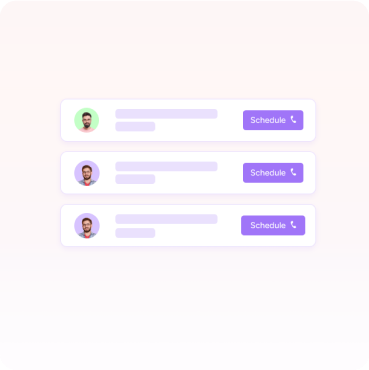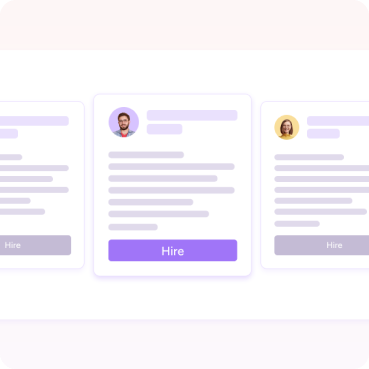Regular hiring
High RiskHire Java Developers of Silicon Valley caliber
Hire pre-vetted full time remote Java Developers from India. Hire now and build your dream engineering team with Hyno
Join 4,000+ companies already growing








Our Top Remote Developers
Hyno conducts rigorous testing and carefully vets the developers who are fueled by passion and skill sets. Hence, our developer community is the foundation for innovation and collaboration, bringing ideas and projects to fruition.
OUR STANDARDS
Hyno vs. Your regular recruitment process.
Find a risk-free, pre-interviewed, high-quality developer who is remote-ready in less than 2 weeks at 40% less cost.
Parameters
Choose the right for your firm.Time
Fees
Quality
Pre Screening
Remote readiness check
Termination
Failure rate
1 - 4 Months
> $1000
High
Low
Freelancing
High Risk1 - 2 Months
No fee
No
Very high
 Low Risk
Low Risk
0 - 15 Days
No fee
No
Very low
Pricing Starts from $35/hr
Accomplishing everything in just 3 steps
Our technical manager aligns the required skillset and tech stack with our talent pool to help you find the best fit.

Shortlisting candidates
Precise Hiring: Understanding, Gathering, and Shortlisting nittygritty.
-
 We start by thoroughly understanding your unique needs and specifications.
We start by thoroughly understanding your unique needs and specifications.
-
 check markWe
align the developer details with company goals. This way, we tailor the candidate
selection to seamlessly integrate with the organization’s vision and goals.
check markWe
align the developer details with company goals. This way, we tailor the candidate
selection to seamlessly integrate with the organization’s vision and goals.


Scheduling an Interview
Effortless talent selection: Finding your perfect match
-
 We connect you with the chosen candidates to ensure a personalized experience.
We connect you with the chosen candidates to ensure a personalized experience.
-
 Our rigorous
selection process guarantees that you find candidates who align seamlessly with your
requirements.
Our rigorous
selection process guarantees that you find candidates who align seamlessly with your
requirements.


Onboarding the talent
Streamlined onboarding for peak performance.
-
 The selected/qualified talent integrates smoothly through structured onboarding to
quickly adapt to projects, processes, and team dynamics.
The selected/qualified talent integrates smoothly through structured onboarding to
quickly adapt to projects, processes, and team dynamics.
-
 We go beyond
integration to offer ongoing support for a seamless transition to ensure that the
new talent exceeds your expectations.
We go beyond
integration to offer ongoing support for a seamless transition to ensure that the
new talent exceeds your expectations.


Read hiring guide
A one-stop shop to hiring the right Java Developer
How to hire a Java Developer? Skills to look for, interview questions, and more
Hiring a dedicated developer for your business can
be a cumbersome task. As many companies are competing to hire top Java Developer, so
finding a good developer is not as easy as it may seem.
We're here to assist all employers who choose to hire Java Developer on their
own. Recruiting a developer on your own requires a fair amount of software
development experience in general. However, if you're a non-technical manager
interested in learning more about how to hire a Java Developer, we've put up
an excellent resource for you.
Things to check Key Skills Required for a Java Developer?
The following are the key skills that a developer should possess to become proficient in Java:
1. Proficiency in Java programming: The candidate should have a strong understanding of core Java concepts and should be able to write clean and efficient code.
2. Experience with Java frameworks: candidate should have experience working with popular Java frameworks such as Spring, Hibernate, Struts, or Play.
3. Knowledge of web development technologies: The candidate should be proficient in HTML, CSS, JavaScript, and other web development technologies.
4. Experience with databases: The candidate should have experience working with relational databases such as MySQL, Oracle, or PostgreSQL, as well as NoSQL databases like MongoDB or Cassandra.
5. Familiarity with web services: The candidate should have a good understanding of web services, including REST and SOAP.
6. Experience with build tools and version control: The candidate should be familiar with build tools such as Maven or Gradle, as well as version control systems like Git.
7. Understanding of software testing: The candidate should have experience with unit testing and integration testing frameworks like JUnit, Mockito, or TestNG.
8. Knowledge of software design patterns: The candidate should be familiar with common software design patterns such as MVC, Singleton, and Factory.
Ideal Hiring Process for Java Developer
1. Define the job requirements: Start by defining the specific skills and experience required for the position. This will help you create a job description that accurately reflects the position and attracts qualified candidates.
2. Source candidates: Use job boards, social media, and professional networks to source candidates. You can also consider using recruitment agencies or outsourcing firms that specialize in finding remote talent.
3. Review resumes and applications: Carefully review each resume and application to assess whether the candidate meets the job requirements. Look for relevant experience, technical skills, and education.
4. Conduct initial screening: :Conduct a phone or video interview to get a better sense of the candidate's qualifications and experience. Ask questions about their technical expertise, experience with Java frameworks, and their ability to work remotely.
5. Technical assessment: Have the candidate complete a technical assessment, such as a coding challenge or a programming project. This will help you evaluate their coding skills and ability to solve problems.
6. Conduct virtual interviews: EInvite top candidates for a virtual interview to assess their cultural fit, communication skills, and work experience. Ask questions about their past projects, how they work with teams, and their experience working remotely.
7. Check references: Conduct reference checks to verify the candidate's past work experience and performance.
8. Offer and onboarding: If you decide to move forward with the candidate, make an offer and prepare for their onboarding. This may include setting up their remote workspace, providing access to company tools and systems, and introducing them to the team.
Important Interview questions to ask to Hire a Java Developer
What inspired you to become a Java developer?
This question helps you to understand the candidate's motivation and passion for the job. A good answer could include an interest in coding, building applications, and the challenges and opportunities that come with the role.
What are your favorite Java frameworks?
This question helps you to evaluate the candidate's knowledge of popular Java frameworks and libraries such as Spring, Hibernate, and Struts. A good answer should include an understanding of how these frameworks work and their use cases.
Can you explain object-oriented programming (OOP)?
This question helps you evaluate the candidate's understanding of OOP concepts such as encapsulation, inheritance, and polymorphism. A good answer should demonstrate an understanding of how OOP principles can be applied in Java development.
What is your experience with Java IDEs?
This question helps you evaluate the candidate's proficiency with Java Integrated Development Environments (IDEs) such as Eclipse or IntelliJ. A good answer should include knowledge of how to use these tools to write, test, and debug Java code
What is your experience with SQL and databases?
This question helps you evaluate the candidate's experience with SQL and database management systems such as MySQL or Oracle. A good answer should demonstrate an understanding of how to create, modify, and query databases.
Can you explain the difference between an abstract class and an interface?
This question helps you evaluate the candidate's knowledge of Java classes and interfaces. A good answer should demonstrate an understanding of the differences between the two and when to use each.
What is your experience with Java web development?
This question helps you evaluate the candidate's experience with Java web development frameworks such as Spring MVC or JavaServer Faces. A good answer should demonstrate knowledge of how to build web applications using Java.
How do you approach debugging Java code?
This question helps you evaluate the candidate's approach to debugging code. A good answer should demonstrate knowledge of how to use debugging tools and techniques to identify and fix errors.
How do you stay up to date with the latest Java technologies and trends?
This question helps you evaluate the candidate's approach to continuous learning and professional development. A good answer should demonstrate knowledge of relevant Java blogs, forums, and online resources.
What is your experience with Agile development methodologies?
This question helps you evaluate the candidate's experience with Agile development practices such as Scrum or Kanban. A good answer should demonstrate an understanding of how to work collaboratively in a team and deliver high-quality code in an iterative and incremental manner.
Job Description Template for Java Developer
Location: [Insert Location]
Job Title: Java Developer
Position Type: Full-Time
Salary: [Insert Salary Range]
We are seeking an experienced and highly motivated Java Developer to join our team. As a Java Developer, you will be responsible for the development of high-performance, reliable, and scalable Java applications. You will be working with a team of talented developers to design, develop, and implement complex software systems.
Key Responsibilities:
- Design, develop, and maintain complex Java applications
- Collaborate with cross-functional teams to develop software solutions.
- Write clean, maintainable, and efficient code.
- Identify and troubleshoot software defects and issues.
- Participate in code reviews to ensure code quality and compliance with industry standards.
- Stay up-to-date with emerging trends and technologies in software development.
Requirements:
- Bachelor's degree in Computer Science or related field
- At least 3 years of experience in Java development.
- Strong understanding of Java programming language and related technologies.
- Experience with Spring Framework, Hibernate, and other Java frameworks.
- Proficiency in using SQL databases, such as MySQL and Oracle.
- Experience with Agile software development methodologies.
- Familiarity with front-end technologies such as HTML, CSS, and JavaScript.
- Excellent problem-solving skills and attention to detail.
- Good communication skills and ability to work in a team environment.
- Proven track record of developing high-quality software systems.
We offer a competitive salary, flexible working hours, and opportunities for professional growth and development. If you are a passionate and talented Java Developer looking to take your career to the next level, we want to hear from you!